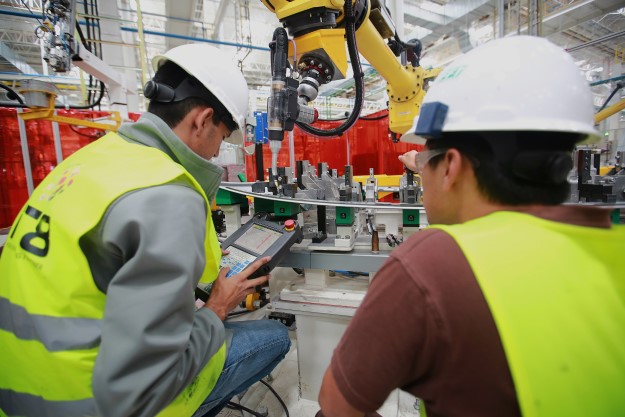Efficient, less costly alternatives made possible through innovation are threatening manufacturing jobs, and raising the question of how “technological unemployment” may change life. In his new book, The Robots Are Coming! Miami Herald columnist and anchor of “Oppenheimer Presenta” on CNN en Español Andrés Oppenheimer says that factory workers are not the only ones who will see their daily job functions impacted by automation: Robots will soon change work across every sector and every region.
The book, with a subtitle that reads “The Future of Jobs in the Age of Automation,” delves deeply into that near future scenario over the course of 380 engaging pages worth of firsthand accounts and in-depth research. Oppenheimer’s travels in Europe, Asia and the Americas are full of illustrative anecdotes and encounters with artificial intelligence, robots and the workers who are facing the prospect of technological unemployment.
“They have already arrived everywhere, but to a lesser degree in Latin America, which is going to be a big problem,” Oppenheimer told AQ.
“Mexico and other Latin American countries are going to be much more negatively affected by the automation of work than some richer nations,” he said. One reason the region is underprepared falls upon leaders who fail to take the phenomenon seriously. “I can count on one hand the number of presidents who knew what I was talking about when I mentioned this tsunami that’s on their doorsteps.”
Oppenheimer says there are few presidents in the region with concrete plans for the future of work. Iván Duque’s strategy to fight technological unemployment focuses on strengthening Colombia’s cultural industries, or the “orange economy.” Other heads of state can only offer cautionary tales. Mauricio Macri was reportedly hopeful after receiving news of a $20 million investment for a new brewery in Argentina, until it was revealed that the facility in question would only employ 22 workers. “That’s the equivalent of an empanada delivery shop!” Oppenheimer told AQ.
Compared to many Asian nations, which are buying industrial robots at full steam, Latin American economies lag far behind. Mexico’s density rate of 36 robots per 10,000 workers dwarfs China’s rate of 97, which has the lowest such rate in Asia, according to 2018 figures from the International Federation for Robotics. Argentina and Brazil’s rates were less than a third of China’s.
“It’s a matter of what’s more efficient,” said Oppenheimer. According to a 2018 Bain & Company study, the cost of an industrial robot fell from the equivalent of 5.3 years of a human worker’s salary in 2010 to the equivalent of 1.5 years of a worker’s salary in 2016. “The trend is irreversible. The robots are becoming increasingly cheap and increasingly smart.”
Machine learning and artificial intelligence are allowing automation to expand its reach into some unexpected job markets outside manufacturing. Workers with interpersonal or client-facing jobs, like teachers and medical professionals, will need to adapt to keep their jobs in an AI-supported workplace.
While the automation of bank tellers has long been a trend at branches worldwide, Oppenheimer claims that bank branches will disappear slower in Latin America than in Europe and the United States, where a larger portion of the population is in the formal banking system. Even so, his book stresses the need to adapt quicker than ever to the changing future of work. “The clerk who worked at a parking lot is being replaced by an automatic cashier overnight,” Oppenheimer said of the existing threat to customer service jobs. “She only has 24 hours to reinvent herself.”
Oppenheimer’s own field has seen encroaching automation eliminate thousands of journalism jobs, but his overall outlook remains positive. “In the long term, I am a techno-optimist,” he told AQ. “Technology has always created more jobs than it has killed, and I think that will continue to be the case; the problem will be the short term.”
“We all need a plan B, whether you are a factory worker or anything else. The nature of jobs is going to change substantially, and nobody is going to escape it.”
—
Miller is the production editor at AQ








